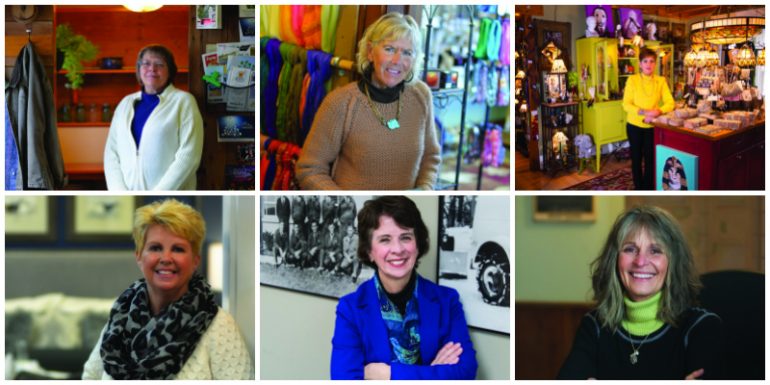By John Halverson
Throughout most of history, women couldn’t own property, much less businesses.
Well, things have changed. More than 1,200 companies are started by women each day in the United States. Four out of 10 new businesses are run by women — nearly double that of 1997.
So, in honor of International Woman’s Day, March 8, here are some stories of successful women business owners who have broken the so-called glass ceiling.
A FARMER AND SCIENTIST
Susan Bellman sits in her cozy, no-frills office sipping tea. The office is on the farm she grew up on. It remains a working farm, but it’s also the home of Great Lakes Agricultural Research Service Inc., the company she owns.
Bellman is a smiling, gracious presence. She serves coffee to her visitor and shows him a black-and-white photo of the farmstead it was years ago. “When I grew up, men ran the farms,” Bellman says. “But my dad had four daughters.”
Not only did she take over the farm when her father retired, but she started Great Lakes Agricultural, a contract research business which tests chemicals and their effects on soil.
Located outside of Delavan, the farm has been in her family for more than 100 years. Bellman bailed hay and did other farm chores growing up, but she had more ambitious plans for herself, even then.
Bellman went to school at UW-Madison, then got her master’s degree in Weed Science at Colorado State University. Before starting Great Lakes Agricultural she worked in the agricultural chemical industry.
There were only three female field researchers in the country when Great Lakes Agriculture started in 1987. Now a quarter of the contract farms in the country are run by women.
Was it hard getting a start in a field so dominated by men? “Well, I was pretty feisty, and going to Madison I was a big woman’s libber,” she says. “You had to be one to make it.”
Bellman actually credits being a woman as one of the reasons she got her first job. Companies were legally obligated to hire a certain number of females. “I wasn’t too keen on being hired because I was a woman,” she says. “That was kind of offensive, but I took the job.”
Now she’s pushing for more women to give her profession a try. She says in her industry, gender doesn’t matter anymore.
BECOMING 2BOSSLADY
Rita Yadon felt men didn’t respect her as a businesswoman when she took over Arbor Vista Nursery in Delavan. She and her husband started Arbor Vista when they married in 1978 and she took over when they divorced 15 years ago.
“It took me a while to communicate with men, for them to relate to me as a professional, where I felt respected as a person. You think of women in the greenhouses making flower arrangements, but this is farming,” Yadon says, “and farming is traditionally a man’s game.”
Now, she’s happy to have an email address that reads 2bosslady.
How did she do it? “I just kept at it. I learned by osmosis, by being in the field and learning what worked and what didn’t work,” she says.
Now her youngest son is taking over the business and Yadon is stepping back.
Not lacking in interests, and no one-dimensional woman, she’s interested in yoga — and has a cell phone with a Jimi Hendrix song as the ring tone.
So what’s she going to do? “I’ve been in business so long that I need this door to close before I can open another one,” she says. “It’ll be interesting to see where my life goes.”
Optimistic? “Why not?”
THE MILKMAN’S DAUGHTER
Debra Alder is another woman in what was once a man’s game.
She has fond memories of delivering milk with her father on Christmas. Her father started work as a milkman when he was just 14 years old delivering to the cottages at Lake Lawn Lodge.
Now, Alder runs the Delavan-based milk distribution firm known as the Alder Companies. She has a corner office and a boardroom with a big table – but she’s decidedly real and down-to-earth.
The history of Alder Companies starts with her grandparents who left Switzerland and came to Wisconsin in 1921. They started a farm and milk production company.
“But my father never liked cows or farming,” Alder says. “We always teased him that he liked the trucks much better.”
Her father had the foresight to see how the dairy business was changing. For years, milk was delivered directly to homes, but many of the delivery drivers went off to fight in World War II. That, and changing societal habits, meant that store delivery would take over in the near future.
In 1942, at 18 years old, armed with little more than hutzpah, Alder’s father went to Dean Foods in Chicago and asked if he could be a distributer for them. His sales pitch worked. Alder Companies grew as did Dean Foods, now one of the largest dairy distribution companies in the world.
She was no newcomer to her father’s company, having worked summers there while going to high school and college. As Alder learned the business, she saw her father come to work almost every day until he was nearly 80 years old.
Being a woman owner of a trucking company is rare. In fact, Alder doesn’t know of another female in that role. Did she feel any gender bias? “People questioned you more,” she says. “But once we get into a relationship it doesn’t last long. I think that’s the case with most biases.”
Alder said she hasn’t handled decision-making any differently because she is a woman. “I think the tough decisions I face would have been tough decisions for my father as well,” she says.
Alder Companies has now grown to more than 80 employees in four locations and it’s the employees who Alder feels indebted to. “My great satisfaction is that I think we’re continuing to provide a good living for good people and that’s very important,” she says. “We’ve made this promise to people and we’ll continue as long as we can do it.”
And they kept that promise even through the economic downturn of 2008. “We kept 75 to 80 families working good jobs and getting good benefits in a terrible recession,” Alder said. “That’s the driving impetus of what we do. “I think Dad would be proud.”
A BUSINESS BUILT ON FAITH AND PASSION
Kristi Hugunin and her partner didn’t have a business plan or deep financial pockets. They were stay-at-home mothers, without interior design or business degrees.
Yet over 30 years they built up Paper Dolls Home Furnishings and Interior Design from a craft consignment store to a full-fledged home furnishing store complete with a design center. They had faith “and we both just loved decorating,” Hugunin says.
Hugunin and business partner Chris Haak, who retired five years ago, started hanging wallpaper 35 years ago, hence the catchy name, Paper Dolls.
Five years later they embarked on their business adventure by opening a craft consignment store in Elkhorn. Hugunin and Haak took in local craftsmen’s work year-round and sold it for them. “As we made a profit, we would then buy our own inventory,” Hugunin says.
In 1988 they moved from their Elkhorn storefront to their current location in Lake Geneva. It’s the go-to store for locals and Illinois residents who have second homes here. “We furnish their homes here and then their homes in the Chicago area as well,” Hugunin says.
Things have fallen into place for them – business plan or not. Over the last 30 years, Paper Dolls Home Furnishings & Interior Design has grown from a 2,000-square foot storefront to a 16,000-square foot showroom. They have 14 employees, including four interior designers.
“God has always brought me the right employees at the perfect time,” she says. “With faith and prayer throughout the years we have grown.”
SURVIVING KATRINA
Beverly Leonard takes part in triathlons as a hobby and is just as relentless as a female business owner — even a hurricane couldn’t stop her.
Leonard owns Lake Geneva’s Delaney Street Mercantile with her husband Jeffery.
She started work in the health food industry right out of high school; he was a photographer and digital printer. They teamed up to start the first Delaney Street Mercantile, on Delaney Street, in a small town in Oregon.
They lived in Hawaii, France and Mexico and thought they had found a lasting landing spot when they moved their business to a Mississippi city not far from New Orleans. Three months after moving, Katrina hit. They lost everything. “As we like to say, we were out about $1 million from an afternoon storm,” Leonard says.
Eventually they started looking for a new place to start over. They came to Lake Geneva, but not without concerns. When they started Delaney Street in Lake Geneva in 2005 their store location was considered out of the main business district. “But we always figured if we made the shop beautiful enough people would cross the street,” Leonard says.
She’s succeeded. Delaney Street Mercantile is beautiful enough that it’s won five beautification awards from the city and one Community Betterment Award from the local chamber. “People come into our store now and ask where did you get all your stuff,” she says. “I tell them, it didn’t happen overnight.”
‘I DON’T REALLY CARE IF I MAKE MONEY’
Pam Ellis’s husband calls her job mission work. And that’s the state of mind that Ellis uses to run her business, Global Hands, a fair-trade shop that recently moved to Burlington after 10 years in Lake Geneva.
Ellis made her living as a horticulturist before discovering the fair-trade concept while running a fair-trade show for a church group. It was a life changing event. “I said to myself, why aren’t there more stores that sell fair-trade goods,” she says. “That’s when I knew I had the ability that I could do it. I had a passion.”
A gregarious woman, she told her story this winter on her last day in Lake Geneva, encircled by her goods – salt lamps, a variety of Buddhas, great-smelling soaps, tiny chessboards and funky clothes. Almost all are hand-made by citizens in developing countries.
The money those craftspeople make helps in sending their children to school, filling nutritional needs, paying for doctors and putting roofs over their heads.
Sometimes it’s difficult to relate to their plight in our society of riches, but shortly before she started planning Global Hands, Ellis went through an experience that gave her unique insight to the Third World life – an operation that wired her jaw shut for 13 weeks.
“I learned how grumpy people can get when they’re hungry,” she says. “People here don’t know how lucky we are. They turn a faucet and water comes out.”
Ellis created the business plan for Global Hands with her daughter, Lindsey, who has a finance degree and functions as the shop’s accountant.
“We held our own,” she says of her experience in Lake Geneva. She tapped into a market that draws more than a million tourists a year and many more day-trippers. Ellis admits leaving Lake Geneva is bittersweet. But she’ll have even more opportunities in Burlington as part of a nonprofit consortium.
“I don’t really care if I make money.” As her husband says, it’s mission work.
Six women entrepreneurs. Six women with success stories. Six women who broke the glass ceiling.
As another woman once said years ago, “I suppose I could have stayed home and baked cookies …”
Food for thought.





